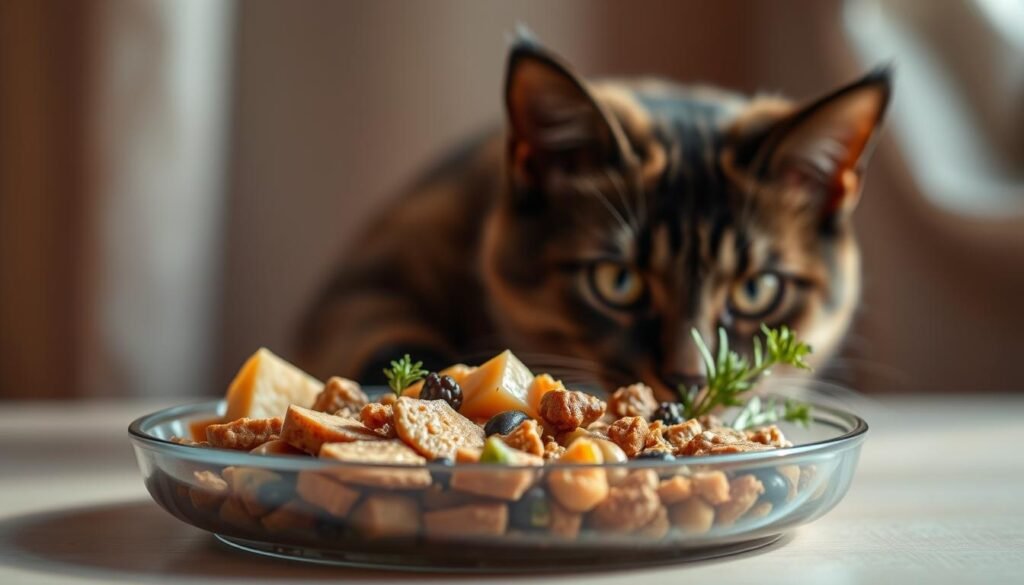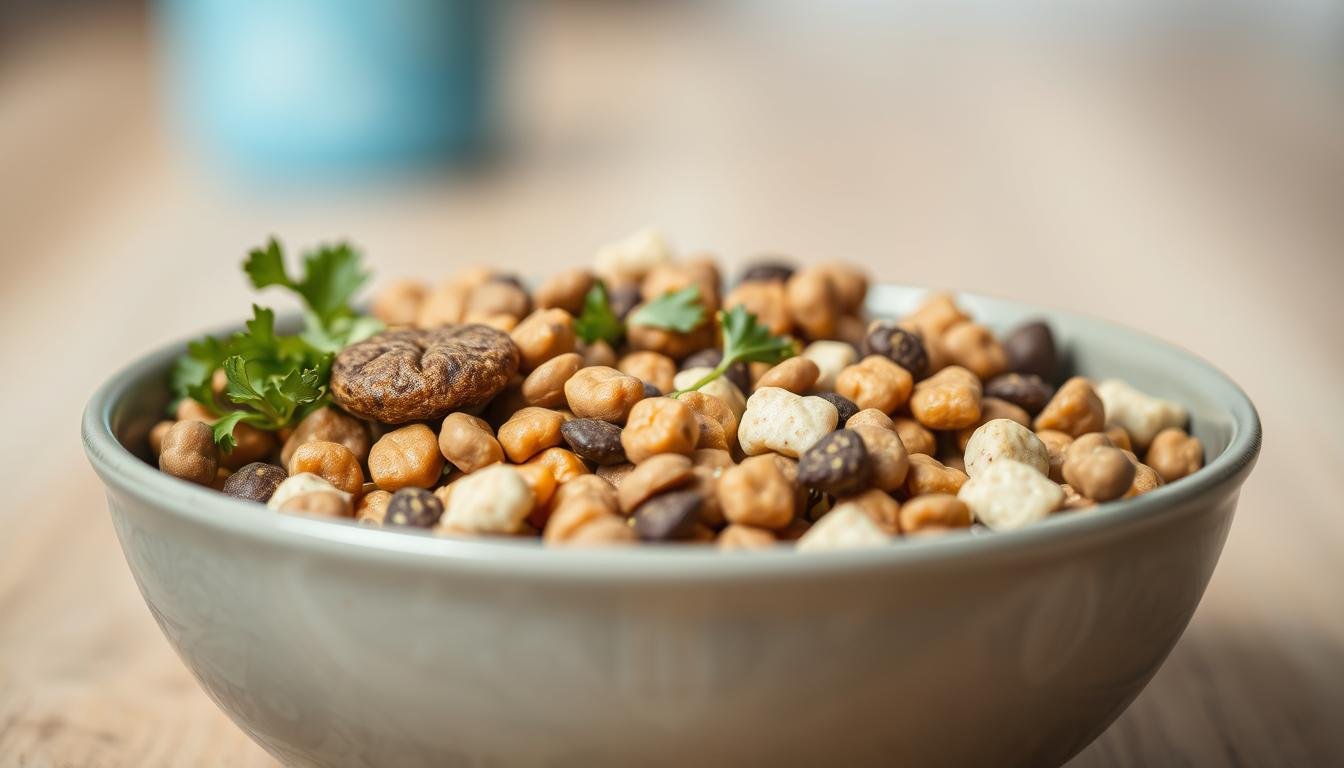Top Cat Food for Cats With Allergies That Vets Actually Recommend
Table of Contents
If you’re a concerned cat owner, you might have seen your pet scratching a lot. They could also have digestive issues or skin problems. These signs might mean your cat has a food allergy.
Finding and handling these allergies can be tough. But, hypoallergenic diets might help. A special diet can ease your pet’s discomfort and boost their health.
Find out the best hypoallergenic options. They can greatly improve your pet’s life. They help reduce allergy symptoms and make your pet feel better overall.
Understanding Cat Allergies and Food Sensitivities
If your cat is scratching a lot, has skin problems, or digestive issues, it might have a food allergy or sensitivity. Cats can react to certain foods just like humans do.
It’s important to know about cat allergies and sensitivities to help your cat. Food allergies happen when a cat’s immune system reacts to a food. Sensitivities or intolerances are reactions that don’t involve the immune system.
Common Symptoms of Food Allergies in Cats
Food allergies in cats can show in many ways. They might scratch a lot, have skin problems, or have digestive issues. You might see your cat scratching or chewing at their skin, leading to hair loss and skin lesions. They could also vomit or have diarrhea.
Difference Between Food Allergies and Food Intolerances
Food allergies and intolerances both cause problems, but they’re different. Allergies are an immune system reaction. Intolerances are more about digestive issues. Knowing the difference helps manage your cat’s health better.
By spotting the symptoms and understanding the differences, you can help your cat live a better life. This means a more comfortable and healthy life for them.
How Diet Affects Your Cat’s Allergic Reactions
The food your cat eats can make allergies better or worse. Knowing how diet affects allergies is important for relief.
The Role of Proteins in Cat Allergies
Proteins often cause cat allergies. Cats need a lot of protein because they are meat-eaters. But, some proteins can make them allergic. Novel protein cat food is a good choice. It uses new proteins that cats are less likely to be allergic to.
Common Food Allergens for Cats
Beef, dairy, and fish are common allergens. They are in many cat foods, making it hard for sensitive cats to avoid them. Identifying and avoiding these allergens is key. “A hypoallergenic diet can greatly reduce allergy symptoms in cats,” say vets.
Switching to a diet without common allergens and with new proteins can help your cat feel better.
The Best Cat Food for Cats with Allergies: An Overview
Choosing the right food is key for cats with allergies. They need a diet that avoids common allergens. This helps prevent allergic reactions.
There are many cat food options for allergic cats. These include prescription diets and over-the-counter foods. You can also find wet and dry food formats. Knowing the differences is important for making a good choice.
Prescription vs. Over-the-Counter Options
Prescription cat foods are best for severe allergies. They are made to tackle specific allergy issues. You can only get them from a vet. Prescription cat food is tested thoroughly and targets specific allergens.
Over-the-counter (OTC) cat foods are easier to find. They don’t need a vet’s prescription. Some hypoallergenic cat food options can help with mild to moderate allergies.
| Feature | Prescription Cat Food | Over-the-Counter Cat Food |
|---|---|---|
| Availability | Available through a veterinarian | Available in pet stores and online |
| Formulation | Specifically formulated to address severe allergies | May not be as highly specialized |
| Cost | Generally more expensive | Can be more affordable |
Wet Food vs. Dry Food for Allergic Cats
Choosing between wet and dry food depends on your cat’s needs. Wet cat food has fewer carbs and might be better for allergies. Dry cat food is convenient and good for teeth.
Some cats do well with both wet and dry food. Others prefer one or the other. Watch how your cat reacts to their food and adjust as needed.
Hypoallergenic Cat Food: What Makes It Special
Hypoallergenic cat food is made for cats with allergies. It helps reduce allergic reactions. This food is designed to be safe for cats with sensitivities.
How Hypoallergenic Formulas Work
Hypoallergenic formulas use new ingredients or broken-down proteins. These are less likely to cause allergies. They avoid common allergens, making the food gentle on your cat’s stomach.
Top Hypoallergenic Cat Food Brands
Several well-known brands offer hypoallergenic cat food. Two top brands are Royal Canin and Hill’s Science Diet.
Royal Canin Hypoallergenic Options
Royal Canin has many hypoallergenic formulas for cats with allergies. Their products are based on scientific research. They come in different types to fit your cat’s needs.
Hill’s Science Diet Sensitive Stomach Formulas
Hill’s Science Diet has hypoallergenic cat food that’s easy to digest. It’s made to reduce allergic reactions. Their formulas are great for cats with food sensitivities.
| Brand | Formula Type | Key Ingredients | Price Range |
|---|---|---|---|
| Royal Canin | Hydrolyzed Protein | Chicken, Rice | $40-$60 |
| Hill’s Science Diet | Novel Protein | Turkey, Barley | $35-$55 |
Limited Ingredient Cat Food Options
For cats with sensitive stomachs or allergies, limited ingredient cat food is a good choice. This food has fewer ingredients to lower the risk of allergic reactions.
Benefits of Fewer Ingredients
One big plus of limited ingredient cat food is it lowers the chance of allergic reactions. With fewer ingredients, cats are less likely to react to something. This can help reduce symptoms like itching, scratching, and stomach problems.
Simplified ingredient lists also help cat owners spot and avoid allergens. This makes it easier to keep their cat’s diet safe.
Best Limited Ingredient Diets for Allergic Cats
Several brands offer top-notch limited ingredient cat food. Two well-known brands are:
- Natural Balance L.I.D. Formulas
- Blue Buffalo Basics Limited Ingredient Diet
Natural Balance L.I.D. Formulas
Natural Balance has a variety of limited ingredient formulas for cats with allergies. Their recipes use a single protein source and few carbs. This makes it easier to manage allergies.
Blue Buffalo Basics Limited Ingredient Diet
Blue Buffalo Basics is also a favorite among cat owners. It has a simple ingredient list with a single protein source and no poultry by-products. This makes it great for cats with sensitivities.
Both brands are known for their quality ingredients and helping manage feline allergies.
Novel Protein Cat Foods: A Solution for Protein Allergies
Novel protein sources in cat food are becoming more popular. They help cats with protein allergies. Cats with allergies need a diet without common proteins they’re sensitive to. Novel proteins are a good solution.
Novel protein cat foods use new protein sources. This reduces the chance of an allergic reaction. They’re great for cats with protein allergies.

What Are Novel Proteins?
Novel proteins are uncommon in cat food. Examples include venison, duck, or salmon. They’re called “novel” because they’re not usual in cat food.
These proteins are less likely to cause an allergic reaction. This is because cats haven’t been exposed to them before. It’s a good choice for cats with allergies to common proteins like chicken or beef.
Top Novel Protein Cat Food Brands
Several brands offer novel protein cat foods. They have different formulas for cats with protein allergies. Here are a couple of top brands:
Merrick Limited Ingredient Diet with Novel Proteins
Merrick’s Limited Ingredient Diet uses novel proteins like venison or lamb. It also has simple carbs. This brand is known for quality ingredients and no fillers or artificial preservatives.
Instinct Limited Ingredient Diet with Novel Proteins
Instinct’s Limited Ingredient Diet has novel proteins like rabbit or duck. Instinct makes grain-free, high-protein recipes. These recipes are close to a cat’s natural diet, making them good for cats with allergies.
| Brand | Novel Protein Source | Grain-Free |
|---|---|---|
| Merrick | Venison, Lamb | Yes |
| Instinct | Rabbit, Duck | Yes |
Grain-Free Cat Food: Is It Right for Your Allergic Cat?
For cat owners with feline allergies, choosing grain-free cat food is a big decision. Grain-free diets have become popular because people think grains cause allergies in cats. But, whether a grain-free diet is right for your cat depends on their allergies and needs.
The Science Behind Grain-Free Diets
Grain-free cat foods remove common grains like wheat, corn, and soy. These grains can cause allergic reactions or sensitivities in cats. The idea is to remove these allergens to help with symptoms like itching and skin problems. But, not all cats with allergies react to grains; some may be allergic to proteins like beef, dairy, or fish.
Key Considerations:
- The primary allergen causing your cat’s symptoms may not be grains.
- Grain-free diets can sometimes substitute grains with other potentially allergenic ingredients.
- The nutritional balance of grain-free cat food should be evaluated to ensure it meets your cat’s dietary needs.
Best Grain-Free Options for Cats with Allergies
If you’re considering grain-free cat food for your allergic cat, there are good options. Here are a couple of notable brands:
Wellness CORE Grain-Free Formulas
Wellness CORE offers grain-free formulas rich in protein and high-quality ingredients. Their recipes are balanced and avoid common allergens.
Taste of the Wild Grain-Free Options
Taste of the Wild grain-free cat foods use real roasted meats and have no grains or fillers. They aim to mimic a cat’s natural diet, potentially reducing allergic reactions.
Comparing these and other grain-free cat food options can help you choose:
| Brand | Protein Source | Grain-Free |
|---|---|---|
| Wellness CORE | Turkey, Chicken | Yes |
| Taste of the Wild | Beef, Lamb, Salmon | Yes |
Dr. Lisa Pierson, a veterinarian, says, “Choosing a grain-free diet should be based on your cat’s specific needs and allergies, not just a general assumption about grains.”
“The key to managing feline allergies is identifying and avoiding the specific allergen causing the reaction.”
In conclusion, grain-free cat food might be good for some cats with allergies. But, it’s important to find out what’s causing your cat’s allergic reactions before changing their diet.
Natural and Holistic Cat Food for Sensitive Systems
Cats with sensitive systems can really benefit from natural and holistic cat food. These diets use natural ingredients and avoid artificial additives. This makes them a good choice for cats with allergies.
What Makes Cat Food “Natural” or “Holistic”
Natural cat food doesn’t have artificial preservatives, colors, or flavors. Holistic cat food looks at the cat’s overall health. It includes natural ingredients, vitamins, and minerals to help keep the cat healthy.
Top Natural Cat Food Brands for Allergic Cats
Many brands offer top-notch natural and holistic cat food. Here are a few you should know:
Halo Holistic Seafood Medley Sensitive Stomach
Halo Holistic Seafood Medley is made for cats with sensitive stomachs. It has a mix of seafood proteins and no artificial stuff.
Solid Gold Holistic Sensitive Stomach Formulas
Solid Gold has formulas for cats with sensitive stomachs. Their recipes have prebiotics and probiotics to help with digestion.
| Brand | Key Features | Benefits |
|---|---|---|
| Halo Holistic | Seafood Medley, No Artificial Ingredients | Gentle on Sensitive Stomachs |
| Solid Gold | Prebiotics, Probiotics, Holistic Formula | Supports Digestive Health |
Probiotic-Enhanced Cat Food for Digestive Health
Probiotics are key for a cat’s digestive health, especially for those with allergies. Cats with allergies often face digestive problems. Adding probiotics to their diet can help solve these issues.
How Probiotics Help Allergic Cats
Probiotics are live microorganisms that offer health benefits. For cats with allergies, they help by improving the gut microbiome. They also boost the immune system and lower inflammation.
Key benefits of probiotics for allergic cats include:
- Improved digestion
- Enhanced immune response
- Reduced symptoms of allergies
Best Probiotic Cat Foods and Supplements
Choosing a probiotic-enhanced cat food or supplement from a trusted brand is crucial. Here are some top picks:
Purina Pro Plan FortiFlora
Purina Pro Plan FortiFlora is a well-known probiotic supplement for cats. It contains Enterococcus faecium, a probiotic that keeps the gut healthy.
Nulo Freestyle Probiotic Cat Food
Nulo Freestyle Probiotic Cat Food is a top-notch, grain-free option with probiotics. It has a mix of proteins and Enterococcus faecium to support a healthy gut.

Homemade and Raw Diet Options for Cats with Allergies
More cat owners are choosing homemade and raw diets to help their pets with allergies. These diets can be made to fit a cat’s specific needs, which might help lessen allergy symptoms.
Benefits and Risks of Homemade Cat Food
Making your cat’s food at home lets you pick the ingredients. This is great for cats with allergies. Key benefits include avoiding common allergens and making sure the food has the right nutrients for your cat.
- Customization to meet individual cat needs
- Avoidance of preservatives and additives found in commercial foods
- Potential for improved digestion and reduced allergy symptoms
But, homemade cat food also has risks. It can be unbalanced if not made right. It’s very important to talk to a vet or a certified animal nutritionist to make sure the diet is balanced.
Simple Recipes for Allergic Cats
Here are two easy recipes to start with. Recipe 1: Boiled chicken and sweet potato. This mix is easy to digest and avoids common allergens like beef and dairy.
- Boil chicken breast until cooked
- Bake or boil sweet potatoes until tender
- Mix together, ensuring a balanced ratio of protein to carbohydrate
Recipe 2: Raw turkey and green beans. This mix offers a new protein source and avoids common allergens.
- Use fresh, raw turkey as the protein source
- Steam green beans until tender
- Mix together, ensuring the cat receives a balanced meal
Always talk to a vet before changing your cat’s diet, especially if they have allergies or sensitivities.
How to Transition Your Cat to a New Allergy-Friendly Diet
Changing your cat’s food slowly is key for their health and comfort. Switching too fast can upset their stomach and make allergies worse. A careful plan is needed for a smooth transition.
Creating a Gradual Transition Plan
Begin by mixing a bit of the new food with their old food. Slowly add more new food over 7-10 days. Start with 25% new and 75% old, then 50% each, and so on. This gradual transition plan reduces stomach problems.
Monitoring Your Cat’s Response to New Food
Keep a close eye on your cat as you switch their food. Look for signs like vomiting or diarrhea. If these happen, slow down the transition. Also, watch their allergy symptoms. If they get worse, talk to your vet for advice.
By slowly changing their food and watching their health, you can make the switch easier for your cat.
Conclusion: Finding the Right Food for Your Allergic Cat
Managing cat allergies needs a full plan, including the right food. You’ve learned about different cat food types that can help. These include hypoallergenic, limited ingredient, and grain-free options.
Understanding your cat’s needs and talking to your vet can help you choose. Start changing your cat’s diet slowly to avoid stomach problems. Watching how your cat reacts to the new food is key to knowing if it works.
The right food can make a big difference in your cat’s life. By picking a diet that fits your cat’s allergies, you can lessen symptoms and stop future problems. Managing cat allergies takes time, patience, and the right food.

